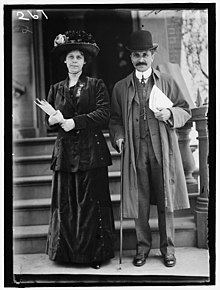Florence Breed Khan
Florence Breed Khan | |
|---|---|
 Florence Breed Khan and Mirza Ali Kuli Khan in 1911, from the Library of Congress. | |
| Born | 1875 Lynn, Massachusetts, US |
| Died | June 24, 1950 (aged 74–75) Teaneck, New Jersey, US |
| Children | 3, including Marzieh Gail |
| Parent |
|
Florence Breed Khan (1875 – June 24, 1950) was an American political hostess and Bahá'i convert from Boston, wife of Mirza Ali Kuli Khan, a Persian translator and diplomat.
Early life[edit]
Florence M. Breed was born in Lynn, Massachusetts, the daughter of Francis W. Breed and Alice Ives Breed.[1] Her father was a shoe manufacturer. Her mother, an active clubwoman, was also a Bahá'i convert, introduced to the faith by suffragist Mary Hanford Ford.
Career[edit]
Breed, who acted as a young woman and studied Eastern religions and texts,[2] married a Persian diplomat, Mirza Ali Kuli Khan, in 1904.[3][4] They met when he was lecturing at Harvard University.[5] Following his diplomatic career, they lived in Washington, D.C.,[6] San Francisco,[7] Paris, Tehran, Istanbul, and Tbilisi.[8]
Khan was a society hostess in Washington while her husband was the Persian chargé d'affaires there.[9][10] "I find that few Americans, even traveled and cultured ones, know Persian as it deserves to be appreciated," she told an interviewer in 1910.[11] The Khan family greeted Bahá'i leader ‘Abdu’l-Bahá on his arrival in Washington in 1912,[12] and hosted a luncheon for him, with guests including Louis Gregory.[13] She contributed Persian recipes to The Economy Administration Cookbook (1913).[14] In 1915, she and her husband attended the Panama-Pacific International Exposition in San Francisco, representing Persia.[15] She was an occasional lecturer on Persia to community groups.[16]
Personal life[edit]
Florence Breed and Ali Kuli Khan had three children, Rahim (born 1905), Marzieh (1908–1993),[17] and Hamideh (1910–1989).[11] Florence Breed Khan died in 1950, in Teaneck, New Jersey, in her seventies.[18] Their daughter Marzieh Gail published a series of family memoirs, Other People, Other Places (1982), Summon up Remembrance (1987), and Arches of the Years (1991).[19][20][21]
References[edit]
- ^ Willard, Frances Elizabeth; Livermore, Mary Ashton (1893). A Woman of the Century: Fourteen Hundred-seventy Biographical Sketches Accompanied by Portraits of Leading American Women in All Walks of Life. Moulton. p. 118. ISBN 9780722217139.
- ^ "Boston Girl Wedded to Persian Nobleman". The Boston Globe. 1904-10-30. p. 1. Retrieved 2020-08-06 – via Newspapers.com.
- ^ "Persian Weds American". Bisbee Daily Review. 1904-11-06. p. 8. Retrieved 2020-08-06 – via Newspapers.com.
- ^ Leonard, John William; Marquis, Albert Nelson (1914). Who's who in America. A.N. Marquis. p. 1313.
- ^ "Mirza and Mme. Kuli Khan". The Valley Falls New Era. 1911-07-27. p. 8. Retrieved 2020-08-06 – via Newspapers.com.
- ^ "Persian Diplomat with American Wife". The Spokesman-Review. 1910-10-09. p. 40. Retrieved 2020-08-06 – via Newspapers.com.
- ^ "Mme. Ali-Kuli Khan is Now in Frisco". The Washington Herald. 1915-05-31. p. 6. Retrieved 2020-08-06 – via Newspapers.com.
- ^ Heller, Wendy (2016). "Gail, Marzieh". Encyclopaedia Iranica. Retrieved 2020-08-06.
- ^ "Women in the News". Passaic Daily News. 1915-03-22. p. 2. Retrieved 2020-08-06 – via Newspapers.com.
- ^ "Returning to Persian Legation". Evening Star. 1918-09-25. p. 10. Retrieved 2020-08-06 – via Newspapers.com.
- ^ a b "Boston Woman Chatelaine". The Boston Globe. 1910-10-30. p. 67. Retrieved 2020-08-06 – via Newspapers.com.
- ^ Menon, Jonathan; April 20, 2012 (20 April 2012). "'Abdu'l-Bahá Comes to Washington". 239 Days in America. Retrieved 2020-08-06.
{{cite web}}: CS1 maint: numeric names: authors list (link) - ^ Lee, Anthony A. (1984). Circle of Unity: Baháʼí Approaches to Current Social Issues. Kalimat Press. pp. 42–43. ISBN 978-0-933770-28-7.
- ^ Rhodes, Susie Root; Hopkins, Grace Porter (1913). The Economy Administration Cook Book. Syndicate Publishing Company. pp. 48–49.
- ^ "Popular Matron Whose Functions Feature Capital's Social Season". The Washington Post. 1914-03-22. p. 9. Retrieved 2020-08-06 – via Newspapers.com.
- ^ "Diplomat's Wife to Speak". Evening Star. 1925-04-18. p. 9. Retrieved 2020-08-07 – via Newspapers.com.
- ^ Chen, Constance M. (1996). "Obituary: Marzieh Nabil Carpenter Gail (1908-1993): Translator and Author, "Patron Saint" of Women Bahá'í Scholars". Baháʼí Studies Review. Retrieved 2020-08-06.
- ^ "Mme Ali Kuli Khan Stricken at Concert". The Record. 1950-06-26. p. 4. Retrieved 2020-08-06 – via Newspapers.com.
- ^ Gail, Marzieh. (1982). Other people, other places. Oxford [Oxfordshire]: G. Ronald. ISBN 0-85398-122-1. OCLC 9890120.
- ^ Gail, Marzieh. (1987). Summon up remembrance. Ali-Kuli Khan, 1879-. Oxford [England]: G. Ronald. ISBN 0-85398-258-9. OCLC 19624777.
- ^ Gail, Marzieh. (1991). Arches of the years. Oxford: Ronald. ISBN 0-85398-325-9. OCLC 24697096.
